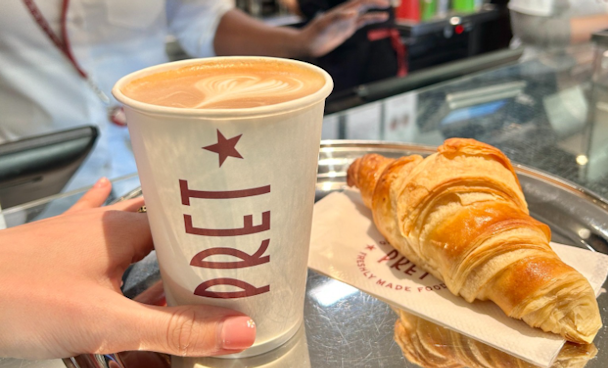Will Pret regret ditching its ‘free’ coffee perk after subscriber backlash?
There’s no such thing as a free lunch – or, as Pret a Manger subscribers are learning, a free coffee. As a big shakeup to the chain’s loyalty program leaves customers frothing, experts examine the pros and cons.

How will this latest change impact customer loyalty? / Pret Instagram
Pret a Manger caused a stir in 2021 by introducing the UK’s first mainstream coffee subscription, offering up to five ‘free’ coffees a day for a monthly fee of £30 in a bid to recoup Covid losses. Now, the chain has ditched the offer, and some customers are not impressed.
Pret UK’s managing director, Clare Clough, said in a statement that the program was initially created as an “innovative way to reconnect with our loyal customers” during the pandemic, but the time had come to move on.
“We know this is a change,” Clough said. “But with Club Pret subscription, our coffees, teas, Cooledon’trs and iced drinks will continue to be the best offer on the high street, and at a much more accessible price than the £360 a year people have to pay for the current scheme.”
Explore frequently asked questions
In justifying the change, Clough added that Pret is now able to provide better value for everyone, not just the minority of Pret subscribers.
The current program offers members five free barista-made drinks a day and 20% off food for £30 a month. From September, members will instead get 50% off up to five drinks a day and no discount on food for a reduced £10 a month. Existing members, though, will get all this for £5 until March 2025.
James Calvert, chief data strategy officer at M&C Saatchi who helped revamp Costa Coffee’s loyalty scheme in 2022, says Pret’s decision isn’t just about customers no longer being able to afford the monthly payments. “It’s a strategic pivot away from an unsustainable, short-term approach,” he says. “Subscriptions work for software, where long-term commitment is accepted, but fail for food and drink, where choice and variety are what we want.”
Calvert, who still works on the Costa account, agrees with Pret’s chief exec that this new approach will help to broaden Pret’s customer base. “Its new strategy targets not just daily drinkers but also occasional buyers,” he says. “By slashing subscription costs and reworking benefits, Pret might just broaden its appeal enough to drive some sustainable growth.”
The subscription offering was designed to bring footfall back to Pret stores in the aftermath of the pandemic, which hit the business hard. In 2021, the business racked up £225.9m in losses, but by 2023 it was crediting the subscription service with helping it return to profit.
Its brand reputation has also struggled in the post-Covid years. According to YouGov data, between July 21, 2020 and July 21, 2024 , Pret’s satisfaction scores declined from 18.6 to 13.9, quality from 21.8 to 20.5 and value for money from 0.8 to -8.7, although the latter will be impacted by price increases from inflation.
Advertisement
Based on this data, the program’s introduction hasn’t been as helpful to its brand performance as it might have hoped. Though Pret’s relentless tinkering may not have helped.
This latest change is just the latest in a line of increasingly significant tweaks. When it was introduced in September 2020, the scheme cost £20 a month. It was then hiked to £25 with the inclusion of 10% off food and then in April 2023, it was upped to £30 a month for free drinks and 20% off food. There has also been one name change to Club Pret and a move to require all transactions through the app.
In April, Caroline Parkes, chief strategy officer of Rapp, called out Pret for its constant changes. “People are, on average, a resistant-to-change bunch. It’s hard-wired into us. Human beings create certainty. Of course, some people thrive on the unknown and the new, but change is rarely perceived as good when it comes to loyalty programs and social media, especially in the UK,” she wrote in The Drum.
Advertisement
“When beloved loyalty programs consider introducing changes, they’d be better aware of the value exchange and how to communicate changes properly. Else, incur Reddit wrath,” Parkes added.
Given the high cost of living that persists in the UK (adults reported an 8 percentage point cost of living increase from Q1 to Q2 2024, according to ONS), strategy partner at Jack Ryan Media, Ryan Dunlop, questions if now was the right time for Pret to reel back its loyalty scheme. The move, he says, risks “alienating” loyal customers who have come to rely on Club Pret rather than seeing it as a nice perk.
Suggested newsletters for you
“The timing of this change could not be more precarious, as consumers are looking for reasons to stay loyal, not reasons to jump ship,” Dunlop says. “Pret hasn’t taken away what people see as a perk, but actually something that is moreover seen as a ‘normality’ - so although Pret has 're-sold' it as extra value with a reduced price, it’s still going to be seen as ‘taking away what I had’ by consumers.”
Social media was ablaze over the weekend with existing subscribers furious with the changes and the company's supposed disloyalty to them. Pret’s calculation will be that if the move results in more new customers, this will be a hit worth taking.
For more brand stories subscribe to the CMO Briefing here.
